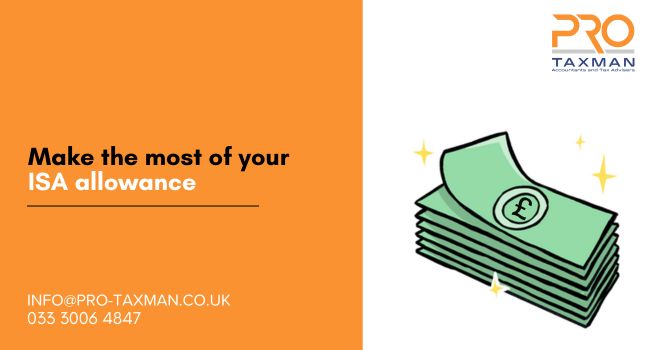Rising interest rates mean that individuals may now be paying tax on their savings income which previously they received it tax free. Where this is the case, it is prudent to consider the options available to earn savings income tax free. ISAs feature on this list.
Savings allowance for basic and higher rate taxpayers
Individuals who pay tax at the basic or higher rate are entitled to a savings allowance. For 2024/25, the savings allowance is set at £1,000 for basic rate taxpayers and at £500 for higher rate taxpayers.
When interest rates were low, many taxpayers did not need to think about tax-free savings accounts as the savings allowance was sufficient to cover any interest that they earned. With higher interest rates, this may no longer be the case. For example, a higher rate taxpayer with savings of £20,000 would only receive interest of £400 a year at an interest rate of 2% which would be covered by their savings allowance of £500. However, if the taxpayer was now receiving interest of 5% on their savings of £20,000, the interest would be £1,000 a year of which only £500 would be covered by the allowance, leaving the remaining £500 taxable.
Additional rate taxpayers do not receive a savings allowance.
ISAs
Individual Savings Accounts (ISAs) are tax-free savings accounts. There are four different types of ISAs:
- cash ISA;
- stocks and shares ISA;
- innovative finance ISA; and
- lifetime ISA.
Individuals have an annual individual savings accounts allowance which they can invest in one or more of the different ISAs.
The limit applies to the amount invested across all four ISAs in the tax year. For 2024/25, the limit is £20,000. The individual can choose how to allocate this. For example, an individual could invest £10,000 in a cash ISA and £10,000 in a stocks and shares ISA in 2024/25. However, investments in a lifetime ISA are capped at £4,000 a year but this counts towards the annual £20,000 ISA allowance.
There is no tax to pay on interest on cash in an ISA or income (such as a dividends) or capital gains on investments held within an ISA.
Cash ISA
Banks and building societies offer cash ISAs which, as the name suggests, are accounts that hold cash only. National Savings and Investments also offer cash ISA products. Interest on cash in an ISA is tax-free.
Where interest from savings accounts exceeds the personal savings allowance, consideration could be given to moving some of the cash to an ISA to allow the interest to remain tax-free.
Stocks and shares ISA
Investments in a stocks and shares ISA can include shares in companies, unit trusts and investment funds, corporate bonds and government bonds. However, it is not possible to transfer stocks and shares already owned outside an ISA into a stocks and shares ISA with the exception of those awarded under an employee share plan.
Innovative finance ISA
An innovative finance ISA is one that contains peer-to-peer loans rather than cash or stocks and shares.
Lifetime ISA
A Lifetime ISA can only be opened by someone aged 18 and over but under 40. A person can invest up to £4,000 a year in a Lifetime ISA until they reach the age of 50. The first payment must be made before they reach the age of 40. The Government add a bonus of 25% (capped at £1,000 a year).
Money can only be withdrawn to buy a first home or on reaching age 60, or if the saver is terminally ill with less than 12 months to live. If withdrawals are made in other circumstances, a withdrawal charge of 25% applies, clawing back the Government bonus.
New UK ISA
At the Spring Budget, the Chancellor announced that the Government would be launching a new UK ISA which would provide savers with the opportunity to earn tax-free savings income while investing in UK companies. The UK ISA will have its own £5,000 allowance which would be available in addition to the existing £20,000 ISA allowance.
The Government are consulting on what this may look like.
Financial advice
It is important to take financial advice from a qualified professional before making investments.
Need professional accounting service or tax advice? Contact us to book a 15-min Free Consultation with us today.
To find out more please follow us on Facebook, Twitter, or LinkedIn. Feel free to contact us on 0333 006 4847 or request a call back by texting 075 6464 7474

